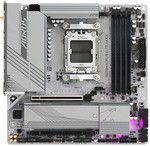Apply coupon MOTHER to save further $10
Great AM5 board at a great price. Fastest boot times with Gigabyte and no need to worry about memory training issues. Set XMP/XPRO and thats it. nothing else.
Also according to the HUB YouTube review its got one of the coolest running VRM's.. this board is Vs 3 equivalent to the black version so rock solid reliable mine's been perfect for the past 6 months.
Surcharges: 0% for bank deposit, Afterpay & Zip Money. 1.2% for VISA / MasterCard & PayPal. 2.2% for AmEx.
Free shipping excludes WA, NT & remote areas.


isn't this too expensive ? just saw a Z890 deal for $250, aren't there any equivalent cheap motherboards for AMD?